DIE, DEAD ZONES, DIE!
Dead zones are remote regions far from cell towers where there are no signals to connect with smartphones. Within the US there are still 500,000 sq miles that aren't covered by any cellular networks.
You can listen to me read this essay here:
Today, Intuitive Machines could become the first private company to land on the moon, at no earlier than 5:49 p.m. EST.
Last month, NASA's first attempt to return to the moon's surface in more than 50 years failed. The new IM-1 mission, a collaboration between Intuitive Machines, NASA and SpaceX, is part of a multi-nation 21st-century race to the moon's south pole.
Pretty exciting.
However, they’re going to need a lot of money, a lot of chemicals and a lot of REE’s (rare earth elements), and a lot of other stuff to make bigger and better machines and rockets to blast off into space. At least, that is, until they can start mining the Moon as early as 2025 and mining asteroids for energy resources that promise to be worth trillions of dollars. In 2015, former US President Barack Obama signed a law that grants US citizens rights to own resources mined in space.
Oh dear. What about China. Russia. They must be doing the same thing. Talk about war….
The real race is to see who can stake their claim and “own” the most space-land, then start mining it before they run out of materials to mine here on Earth.
How will they pay for all of that? They need YOU! Yes, not only do they need to SCRAPE EVERY BIT OF POSSIBLE RESOURCES OUT OF THE EARTH BUT THEY NEED TO SCRAPE IT OUT OF YOU.
It’s a big topic and I’ve gone into the hypocrisy of “clean energy” before, and the necessity of getting the masses to buy into it. You can find links to those essays at the end of this one.
They can’t “take over Space” without first controlling the masses on earth and that means getting them to buy into their plans. And that means getting rid of dead zones.
If you are skeptical, just look at one of the brainwashing techniques they’re working on—one that they’ve already used successfully on earth for years. Ads from space.
A new study from Russia says that projecting ads from space isn’t far-fetched.
And of course, you can be sure that Elon Musk is on it. 50 satellites could rotate along a path where they would constantly be bathed in sunlight for a period of at least three months.
Imagine camping in the Kalahari Desert and awakening at sunrise, not to beauty and serenity, but to the image of a juicy Big Mac beamed from space and lighting up the early morning sky.
How cool would that be?
Before I answer that question, along with the usual “subscribe” button, I want to acknowledge my paid subscribers.
I recently realized they can make comments when they subscribe. Goodness, I never knew that! I want to share some of those comments because they really inspired me! Here are a couple of the latest:
“You are a truth seeker and speaker and hopefully my support will help you amplify its sound.” ~ Erika Marshall
“because one of your essays put the hook in me” ~ Pinebeetle
If you haven’t already, please do subscribe. Thank you to everyone!
One-time or recurring donations can be made at Ko-Fi
Okay, let’s continue…
When I was a teenager, my dad’s idea of a vacation was hiking in the Sierra Mountains, where “no man has gone before”. These were anywhere from 3 to 7-day trips where we had to carry everything we needed in a backpack.
In those days, nobody needed a permit, you just took off into the wilderness. At night, we built a fire, and no one jailed us for it. Nobody even knew we were there, how would they? We rarely ran into anyone else. We had a map and a compass, and we looked at the sun. That’s how we found our way.
We weren’t fools though.
The other day, my friend Kelly—we’ve been friends since we were seven— reminded me how on one trip, a fierce snowstorm was heading our way, and Dad decided we needed to get out fast. As we hiked down the mountain, we came across some other hikers going up. Dad advised them to come with us. They laughed and kept on going. They never made it out. They died up on the mountain.
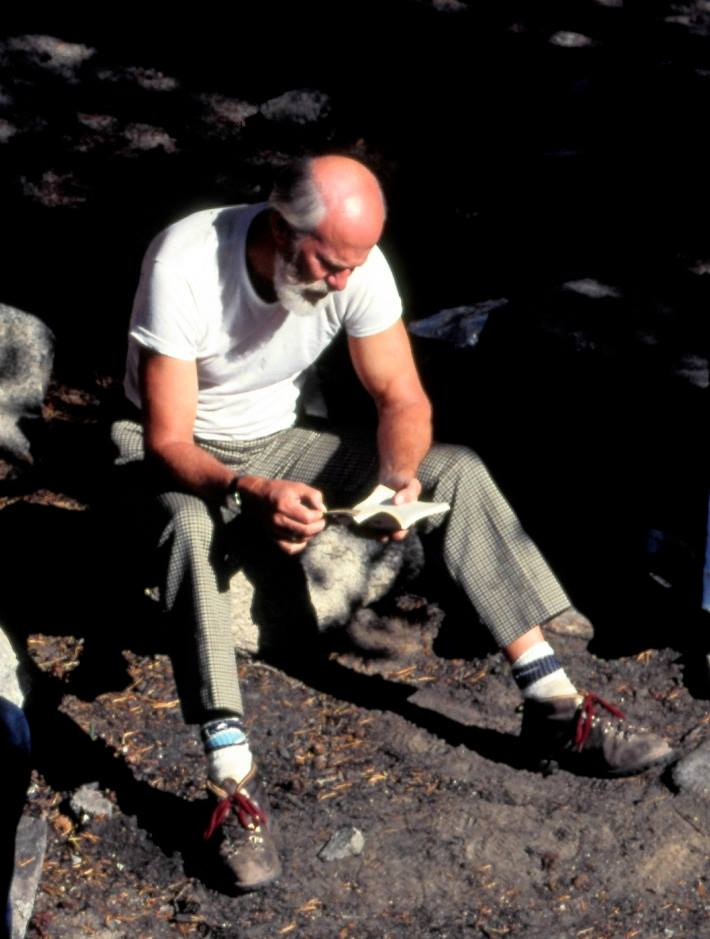
More than anything else, I dreaded the inevitable switchbacks winding back and forth up the steepest paths. I can still hear my dad’s voice calling down to us, “Just around the next bend, come on, you can do it!”
More often than not, there was still another bend and then another, on and on until at last we reached the top.
I had a love/hate relationship with those trips. Everything was a contrast, like the debilitating heat of day and the bitter cold of night. Our sleeping bags were terrible. After a dinner of freeze-dried food or if we were lucky, fresh caught fish, I’d huddle closer to the dying fire until I had no choice but to crawl inside my sleeping bag, stiff in my jacket, two pairs of pants and I don’t know how many pairs of socks.
There I lay in misery, watching the moon move across the sky at a snail’s pace. Once, my sister put a hot rock in her sleeping bag, only to have it burn a hole through the fabric. What could she do? She couldn’t call up Amazon to deliver a new sleeping bag. She had no choice but to endure the rest of the trip with that gaping hole.
The coldest part of the night is just before dawn. I’d watch as the sun peeked over the mountain tops on one side and spill over onto the mountain tops on the other side. Slowly, the blazing light descended until it dispelled all the shadows in the valley where we had camped. At last, the moment came when the warm rays hit me and I’d close my eyes and lift my face as if the sun had saved my life. Which, really, if you think about it, it had. Every day we’re saved by the warmth of the sun.
Of course, those exquisite moments didn’t last. I’d have to hoist on that backpack and off we’d go. As we trudged along the dusty path hour after hour, the heat grew worse and worse. Just when I thought I couldn’t stand my thirst a minute longer, I’d hear a gurgling sound and there would be a stream. Eagerly, I’d fill my tin cup with water. Nothing can ever taste as good as clear, cold water from a mountain stream.
So many times, I wanted to give up. Just sit beside the path and cry. I hated my dad in those moments. And my mom. And everyone else. Sometimes I would sit down and wallow in my misery. But then what? I couldn’t stay there and die. So, I had to get up again and keep on going.
Once I reached the top, all those feelings of exhaustion and resentment, the pain in my legs and feet, washed away. Taking off my backpack I felt as light as air. Looking down the mountain, I thought, wow, how did I do that? All those times I’d thought I couldn’t. But I had!
Those backpacking trips built character and courage. They taught me to choose the best of myself and discard the worst—not that I always made the best choices, but I knew what to strive for.
If you’ve hiked or camped far from civilization, you understand the freedom it gives you. The mystery and wonderment of looking up at the star-filled sky. The absolute silence, and how the crackling of the fire or the hoot of an owl breaks into that silence, impressing how attune you are to the world around you.
Just a week ago, on my last hike in the Santa Monica Mountains before I came to New York; a rattlesnake crossed my path. Rattlesnakes are hard to spot, they blend in so well. On top of that, I hadn’t been paying close attention, thinking it was too early in the year for snakes to appear. But the day was warm so I shouldn’t have been surprised.
I stopped immediately, too close for comfort. The snake lifted its head and very slowly, I backed up a few paces. Then, we both relaxed, and I watched as it slithered into the bushes and disappeared.
If the gods of tech have their way, there will soon be an ap warning hikers when dangerous animals get too close. It’s for your own safety so why wouldn’t you want it? In fact, if you don’t, that’s very suspicious behavior and there will be something dangerous about you.
Never again will we need our natural instincts to protect us or to delight us.
Never again will we unexpectedly come upon a herd of antelope, for example. All those people who say, “I hate surprises”, well, you will be in heaven.
All of this will only be possible if there are no more dead zones. They call these zones “dead”, but nothing could be further from the truth. These are the last places on earth where life remains untouched by the Vast Machine.
Dead zones are remote regions far from cell towers where there are no signals to connect with smartphones. Within the United States there are still about 500,000 square miles that aren't covered by any cellular network.
And that does NOT make Elon Musk happy! No one on earth should be able to escape the Eye of Elon!
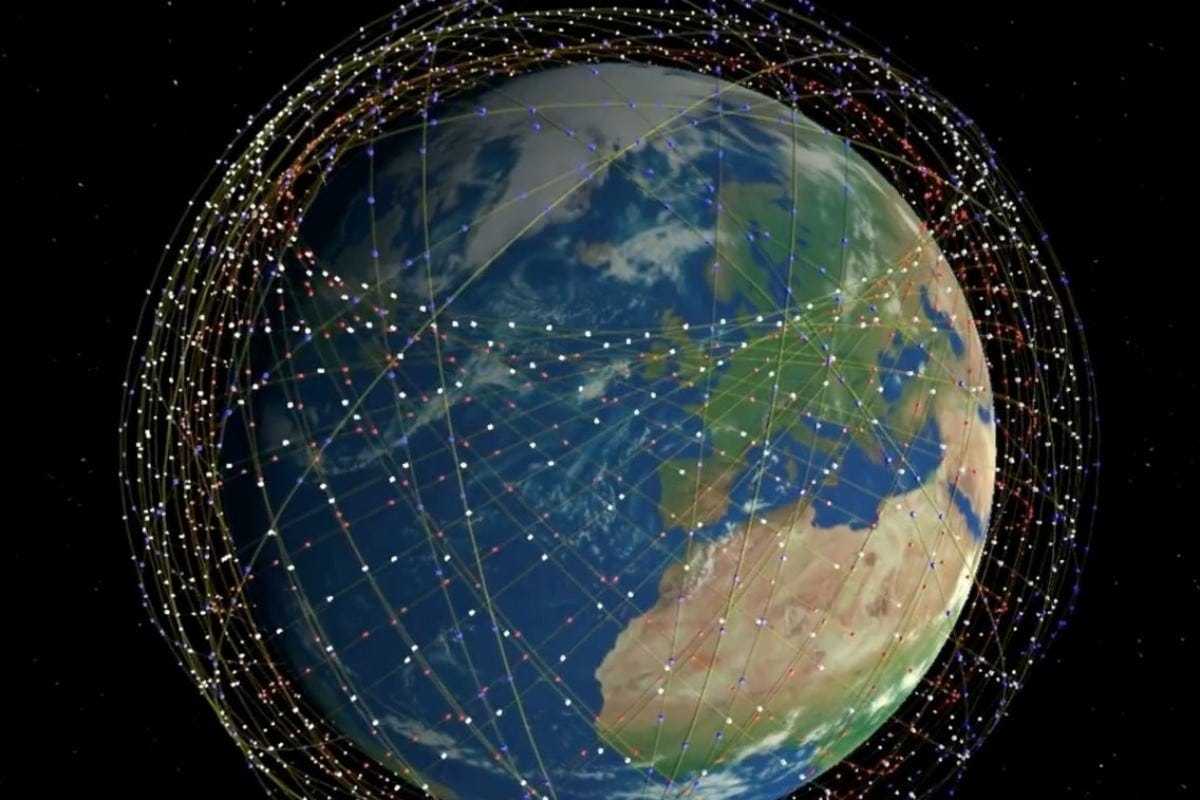
SpaceX Starlink satellites to beam service straight to smartphones.
Elon Musk and T-Mobile are teaming up on a project called Coverage Above and Beyond, which aims to provide smartphone connectivity to T-Mobile customers pretty much everywhere.
"I think this is really a massive game changer," Musk said. "In a nutshell, it's no more dead zones."
…harnessing Starlink, the broadband megaconstellation that SpaceX is building in low Earth orbit. The company has already launched more than 3,000 Starlink spacecraft to date, but none of the currently operational satellites are up to the newly announced job; Coverage Above and Beyond will require Starlink Version 2, which is expected to debut next year.
Version 2 craft will be 23 feet (7 meters) long and tip the scales at 1.25 tons (1,130 kilograms), compared to about 660 pounds (300 kg) for current Starlink satellites. That's so big that SpaceX will need to launch them on Starship, its giant, next-generation transportation system, rather than its workhorse Falcon 9.
…SpaceX will need to juice Version 2 craft even more, outfitting each one with a special antenna about 16.5 feet (5 m) on a side, Musk said.
"They're the most advanced phased-array antennas in the world, we think," Musk said. "The antennas have to be extremely advanced, because they've got to pick up a very quiet signal from your cellphone."
He’s talking about cell phones, but you can be sure that isn’t what he’s thinking about.
The first human subject to be implanted with Neuralink’s brain chip has recovered completely (so Musk informed us on X) and is able to move a computer mouse around the screen by "just thinking."
The next step, whether it’s five years, ten or more, will be to implant everyone with a chip (or whatever technology will be utilized at that point). I mean, why not? Who wouldn’t want to be able to do things by “thought control?”. Thus, the need for no more dead zones. Everyone needs to be connected at all times to the Vast Machine. Just take a look at Google’s Gemini AI that promises to Supercharge your creativity and productivity.
Only a fool would think that the end game is control of a computer “mouse” with your mind. Already, the masses no longer control their mouses. Or their minds.
Whether it’s a favorite influencer or a product or a drug or a presidential candidate, we are being brainwashed to predictably click, by everything from subliminal messages to sheer repetition of information. Control over our minds has been slipping away for decades, especially since the rise of advertising. So subtly and seductively that most people don’t even realize how zombified they are.
We hear more and more about cyberattacks, like this:
What about what might happen when everyone is hooked up and millions of people are attacked—inside their minds. And what if I want to escape to a dead zone? There won’t be any left.
No matter. There are plenty of fools eager to jump on board. You can find them in the responses to Musk’s X announcement, congratulating him with a lot of “Wows!” in the hopes that he might deign to notice them, make a comment back, and send their own likes soaring into the stratosphere for one brief moment of tantalizing fame.
Fellows at the Hastings Center bioethics think tank, have warned against Musk’s brand of “research by advertising”:
Many may not appreciate that “neuron spike detection” is only an acceptable preliminary endpoint for a carefully controlled experiment whose safety is far from established and could engender complications that would leave the human subject in a worse, if not life-threatening, condition. We are not even told what plans there are to remove the device if things go wrong or the subject simply wants to stop. Nor do we know the findings of animal research that justified beginning a first-in-human experiment at this time, especially since it is not lifesaving research. The company has denied that it mistreated primates in response to allegations of animal cruelty. Which scientists—who were not on the Neuralink payroll—decided that the research was ready to try in humans?
This episode reaches beyond one incident. Science by press release, while increasingly common, is not science. When the person paying for a human experiment with a huge financial stake in the outcome is the sole source of information, basic ethical standards have not been met.
Indeed, the same criticism could be made of every scientific company out there. Of course, the glaring difference is that Musk (as the richest man in the world), has bought his very own marketing platform, X, that he uses to promote himself and his products endlessly.
One thing Musk doesn’t promote much on X is his companies’ relationship with the Pentagon. Starlink’s ability to operate in Ukraine with little to no disruptions did not go unnoticed by the Pentagon.
While Starlink is designed for consumer and commercial use, and it gets most the advertising attention, little is known about Starshield.
Launched in December 2022, Starshield is a “program tailored for government clients and led by a former Air Force general - which received a $70 million military award last August for providing communication services to numerous Pentagon partners”.
Starshield has now been awarded a $1.8 billion Starshield Pentagon contract, “emphasizing its increasing role as a vital national security partner, documents obtained by the Wall Street Journal revealed. The collaboration signals a deepening connection between SpaceX, the leading company in the space industry, and the national security establishment”.
'When I'm never sure what I can say in a public forum, I tend to zip it. But I can say that there is very good collaboration between the intelligence community and SpaceX,' Gwynne Shotwell, SpaceX's president said.
On the one hand, the plan on the commercial side might be to control the masses through hooking up to the Vast Machine. On the other hand, the battle over control of the technology to do that could be a major cause of space wars.
Military space assets like satellites and ground systems typically have been considered “support” equipment that provide valuable services such as communications, navigation data and early warning of missile launches. But as the Pentagon has grown increasingly dependent on space, satellites are becoming strategic assets and coveted targets for adversaries.
“It is impossible to overstate the importance of space-based systems to national security,” Air Force Secretary Frank Kendall said in a keynote speech.
Gen. John Hyten, the vice chairman of the Joint Chiefs of Staff, says that “satellites are big fat juicy targets.”
To protect against a potential war in space, Space Command is developing a “space warfighting doctrine.” If, for example, a “laser blinding satellite” attacks the U.S. how would the Defense Department respond?
So many questions and no good answers!
The only foundation of international space law that currently exists, the 1967 Outer Space Treaty, is outdated and doesn’t address most space security issues that could set off a war.
The treaty bans the stationing of weapons of mass destruction in outer space, prohibits military activities on celestial bodies and contains legally binding rules governing the peaceful exploration and use of space. But a new set of rules is needed for the current space age, Smith said. “We really haven’t addressed some of the very difficult questions. Can a nation tailgate another nation’s satellite? Is preemptive self defense going to be permissible? Are we going to ban any form of weapons in space?”
Ugh, more questions with no answers. But it’s so reassuring that they’re asking them—while they keep on with the space arms race.
The question is who can monopolize space with the most satellites and then, of course, there’s monopolizing the moon and Mars and on and on it goes. If we thought war was a problem already, we haven’t seen anything yet. Don’t think they are pausing their plans to monopolize space anytime soon.
Back in 2019, SpaceX filed documents with telecommunications authorities to launch 30,000 small satellites – that is roughly triple the number put into orbit by humans in history so far. Nobody knows how to take over space like Elon Musk—and the United States government.
Of course, they aren’t really worrying about collisions in space or space garbage or the consequences of satellites burning up in the earth’s atmosphere and the chemicals released, or the holes created—oh, remember the ozone scare? Well, now that just might become a reality. I mean, you can look up online and you will see lots of talk about this stuff, but nobody’s doing anything about it. Like everything else from autonomous weapons to CRISPR to AI, they are rushing ahead because everyone wants to be first.
Isn’t it funny how the more they rationalize invading our lives for the sake of “health and safety” the more dangerous the world—and now space—becomes.
It’s all going to be okay. They’re going to prove how committed they are to regulations by making some for ads in space. They aren’t going to project ads twenty-four/seven. That would be terrible!
Only at sunrise and sunset.
So, the next time you go down to the beach to see the sunrise, or up to the mountains to watch a sunset, you just might get the added benefit of an ad for a laxative, or that juicy Big Mac dripping ketchup, or an anti-depressant—which you just might decide you really need at this point. (But don’t do it, it’s just another form of control)
Last I heard, SpaceX would like to spread its Starlink direct-to-handset service beyond the borders of the United States. Just like we spread Coca Cola. Just like it spread McDonalds. Oh, and those anti-depressants.
"This is an open invitation to carriers around the world," says Elon Musk. "Please get in touch with us, and we'd love to partner with you and enable this globally."
Exciting times!
If Intuitive Machines' Odysseus lunar lander can land on the Moon at 5:49 today, just think what they can achieve tomorrow.
Related Essays:
The Magic of Rare Earth Elements & the Hypocrisy of Clean Energy
Nickel: The Dirty Business of Clean Energy




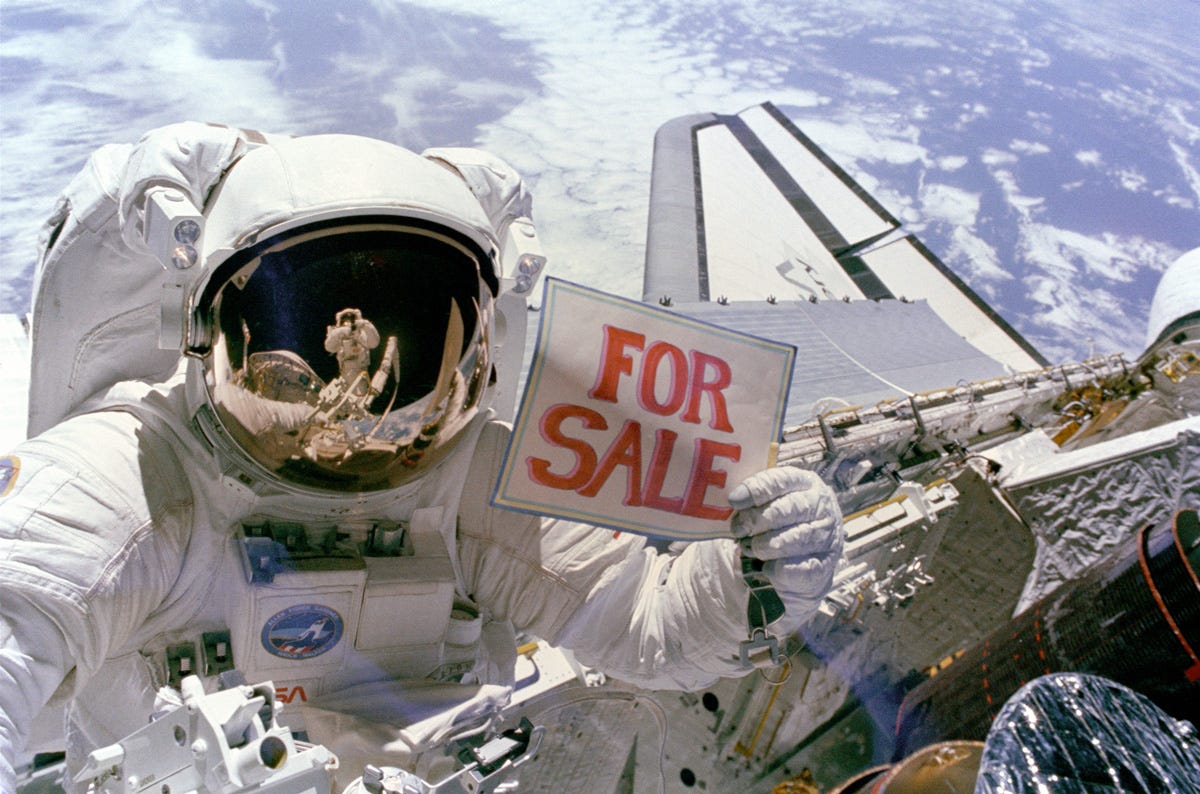
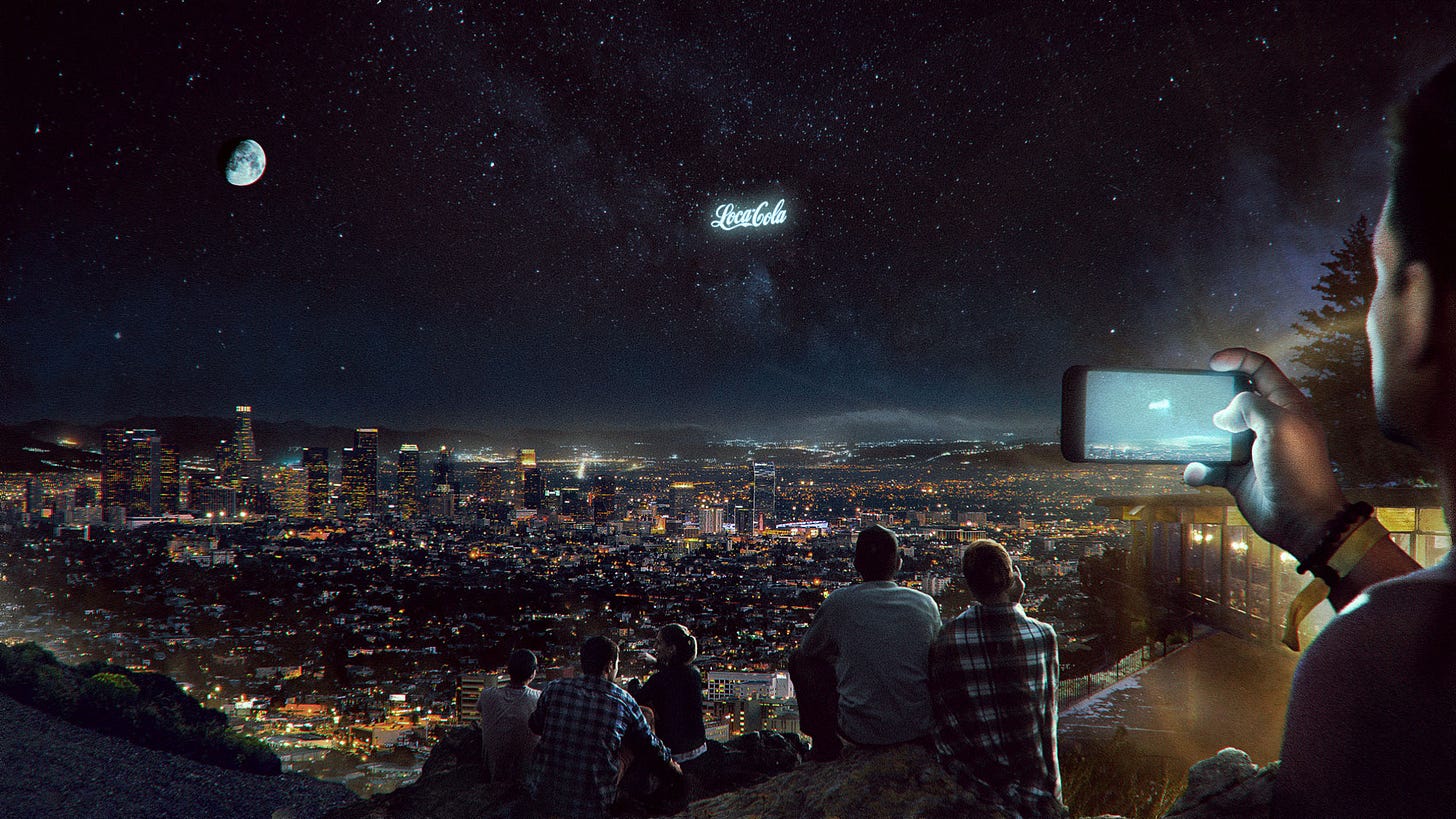
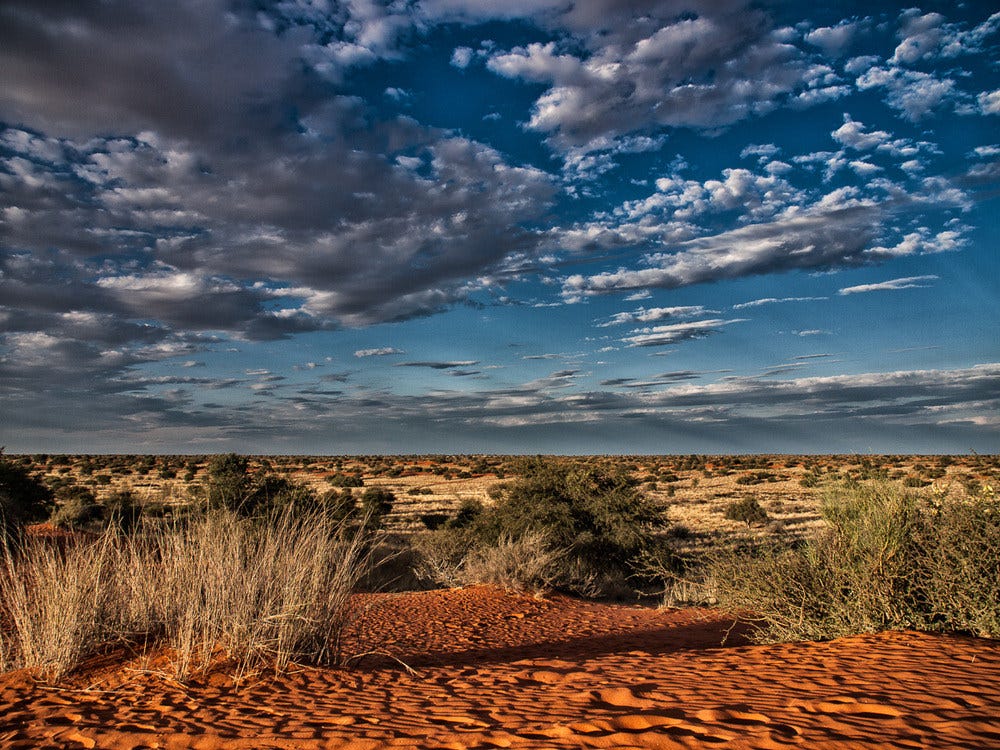
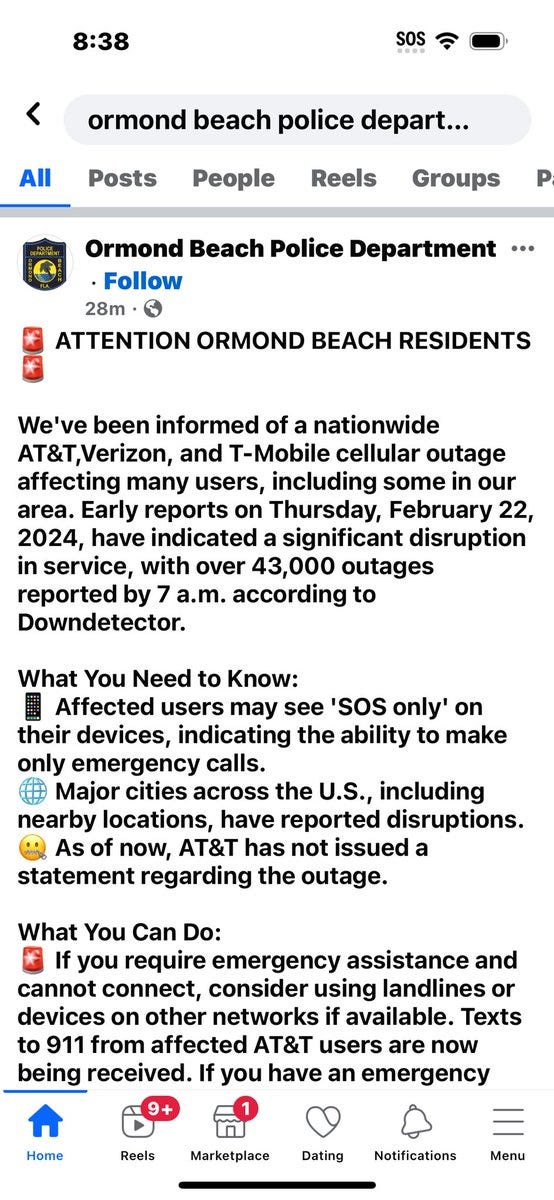
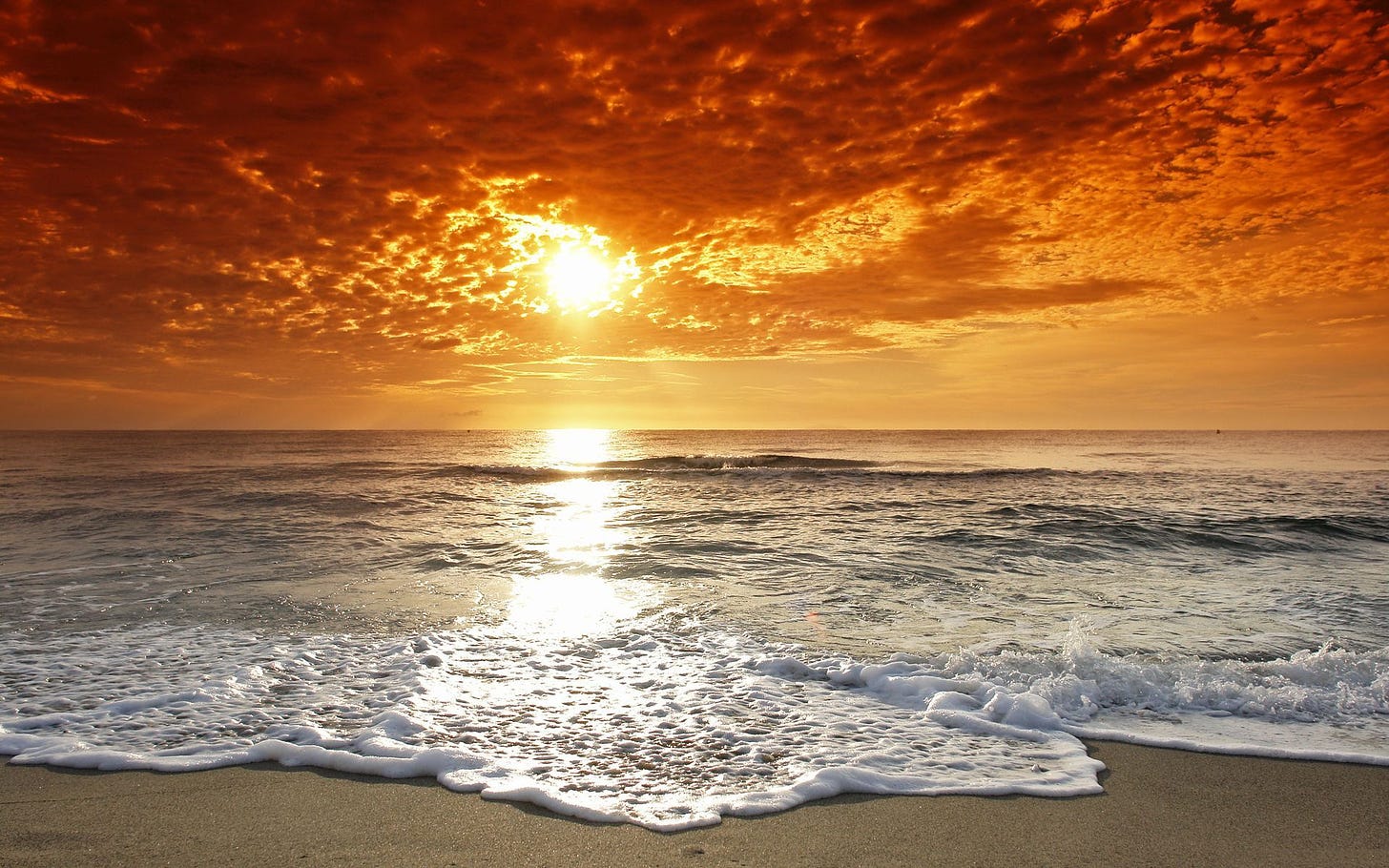
Wow--wull this puts StarLink & StarShield INTO the catty-GORY of Space Weapons--all 'gainst us--and that's why they gotta rewrite the terms again. Benefits WHO? yup, The WHO an' all 've 'em BIG Who's--not the little ones down in WhoVille tho... that's us. Heck fElon even looks like the Grinch! He'll take away, with the help of our gubbamint, EVERYTHING tangible AND our world--our Christmas, our Holidays, our America the Beautiful.... an' turn it inta digital soup with ads "streamin'" 'cross the skies. One quibble I have with these spots bein' "dead zones"--nope, these are Livin' Zones! alive with animules, nature, mountains an' vistas like the ones ya described. An' Sunsets...which Gates-of-Hell is tryin' ta take away from us... I think we need ta expand, not sell off, the Livin' Zones an' allow on 'em creatures 'cept "the Musk!" (I had no idear that much cell-free land existed--that's a good thing!)
Great article, Karen! Some comments:
* I expected the you'd photoshop more advertisements into the natural photos
* Keep up the detailed info about Starlink and Musk's endeavors
* Thank you!
I live in a "dead zone" - a remote organic farm in temperate rainforest deep in the mountains of the Oregon Coast Range. There's cell service about 40 km away. Friends call me a "mountain man". I like to hike and camp in the wilderness all around, often with my dog. No cell coverage is a terrific plus: I encounter more bears and cougars than humans in such places. For safety I carry a ham radio, with which I am expert: I can thus call for help in an emergency. My brother just recently gifted me with a tiny satellite communicator suitable for sending text messages in an emergency. Thus, my wilderness is still a dead zone, but it's becoming less so ...